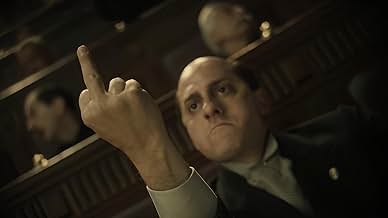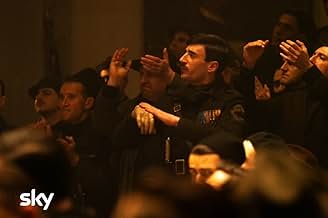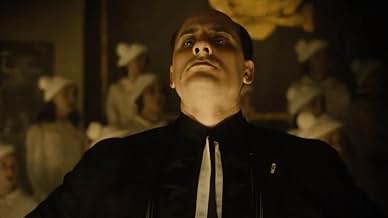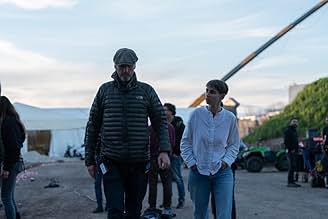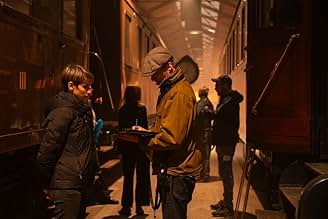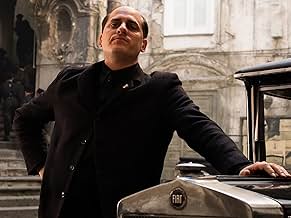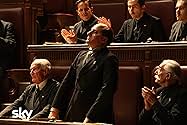Crónica del ascenso al poder del dictador italiano Benito Mussolini en una historia de un país que se rindió a la dictadura.Crónica del ascenso al poder del dictador italiano Benito Mussolini en una historia de un país que se rindió a la dictadura.Crónica del ascenso al poder del dictador italiano Benito Mussolini en una historia de un país que se rindió a la dictadura.
- Premios
- 2 premios ganados en total
Explorar episodios
Opiniones destacadas
While the cinematography is out for everyone to appreciate, I feel a need to stress a couple of key points international audiences might miss.
First and foremost: the series is based on the first of four books about the life of Mussolini, and while they are routinely described as "novels", they are in fact impressively researched from a historical point. Pretty much every dialogue, speech, document and event are openly sourced and beyond question.
While the staging frequently and blatantly is not realistic in order to make the show more spectacular, pretty much everything happened as you see it - including a D'Annunzio's Japanese samurai secretary and other apparently absurd elements.
My second point is about the acting and language. While it will fly above the heads of anyone not _very_ experienced with Italian, the work behind regional accents, lapses into dialects and the very speech patterns of 100 years ago is exceptional indeed. It is a shame this will mostly go unnoticed, as it actually conveys a fair bit of refinement to an already stellar ensemble performance.
Lastly, the (not present in the books) stabs at current politics are far more varied than expected. Like, everyone can understand a sudden fourth-wall-breaking "Make Italy Great Again!", but you'll probably miss the reference to the catastrophic Berlusconi era (delivered via subtle voice and body acting, or even just a brief costume change), or to the sorry state of the last few recent Italian legislatures.
In short: come for the show, stay for the history lesson... and see it with an Italian resident if you can to enjoy it at its fullest.
First and foremost: the series is based on the first of four books about the life of Mussolini, and while they are routinely described as "novels", they are in fact impressively researched from a historical point. Pretty much every dialogue, speech, document and event are openly sourced and beyond question.
While the staging frequently and blatantly is not realistic in order to make the show more spectacular, pretty much everything happened as you see it - including a D'Annunzio's Japanese samurai secretary and other apparently absurd elements.
My second point is about the acting and language. While it will fly above the heads of anyone not _very_ experienced with Italian, the work behind regional accents, lapses into dialects and the very speech patterns of 100 years ago is exceptional indeed. It is a shame this will mostly go unnoticed, as it actually conveys a fair bit of refinement to an already stellar ensemble performance.
Lastly, the (not present in the books) stabs at current politics are far more varied than expected. Like, everyone can understand a sudden fourth-wall-breaking "Make Italy Great Again!", but you'll probably miss the reference to the catastrophic Berlusconi era (delivered via subtle voice and body acting, or even just a brief costume change), or to the sorry state of the last few recent Italian legislatures.
In short: come for the show, stay for the history lesson... and see it with an Italian resident if you can to enjoy it at its fullest.
A solid recommendation from me. I really enjoyed the flow, acting, action, and storytelling. I always find it fascinating how such a destructive force can rise to power-what forces support it, oppose it, and which ones get swayed, and why. The quality of the series is excellent. For me, it belongs in the same league as Der Untergang and Unsere Mütter, unsere Väter.
What makes this series particularly compelling is its exploration of the political landscape in Italy at the time. The power struggles between the socialists, the monarchy, and other factions add layers of intrigue, showing how different forces either resisted or enabled the rise of authoritarianism. The shifting allegiances and moral dilemmas make for gripping storytelling.
On top of that, the action sequences are intense and well-executed. The battles, street clashes, and political confrontations feel raw and realistic, adding weight to the historical events. The choreography, cinematography, and pacing of these scenes keep the tension high, making it a visually and emotionally engaging experience.
What makes this series particularly compelling is its exploration of the political landscape in Italy at the time. The power struggles between the socialists, the monarchy, and other factions add layers of intrigue, showing how different forces either resisted or enabled the rise of authoritarianism. The shifting allegiances and moral dilemmas make for gripping storytelling.
On top of that, the action sequences are intense and well-executed. The battles, street clashes, and political confrontations feel raw and realistic, adding weight to the historical events. The choreography, cinematography, and pacing of these scenes keep the tension high, making it a visually and emotionally engaging experience.
By now it is evident that in the Post-network era and when from the zenith the third Golden Age of Television began its inevitable downward parabola no one, including myself, would have expected such a product... especially an Italian one.
M the son of the century is the classic turn of the century, the breaktrough event or, if you like a film allegory better: it is the hero we need but do not deserve. The future of Our television, it is clear, blatant and unashamed that it will be defined by the 'Before M' and the 'After M'.
Beautiful, beautiful series. Monumental every performance. Ficcanti every dialogue. Generative storytelling from history and brought up to date, without ever becoming exhibitionist. A series one step away from hybris without ever crossing the thin line and, because of this, incredibly verisimilitude in its (deliberate) staging between the theatrical and magical realism.
A possible event, because there is a thick book behind it, not only of volume but also of historical research... but also (oh my God, finally!!!) an adequate budget. It matters little that some images are realistically dated in the staging. It doesn't matter. You want the real date? There's the book but in this instalment it was perfectly there.
A futurist Zang Tumb Tumb series like we've needed for a long time. Because, just like futurism, the last true and pure current of thought and artistic movement that since the publication of its manifesto in 1909 has not found to date a worthy new cultural vision that can be described as truly original and not a rinsing of dishes from other shores. This is M. The first of something else in the making that, los peri pernos, will be even more surprising and innovative.
Zang Tumb Tumb.
M the son of the century is the classic turn of the century, the breaktrough event or, if you like a film allegory better: it is the hero we need but do not deserve. The future of Our television, it is clear, blatant and unashamed that it will be defined by the 'Before M' and the 'After M'.
Beautiful, beautiful series. Monumental every performance. Ficcanti every dialogue. Generative storytelling from history and brought up to date, without ever becoming exhibitionist. A series one step away from hybris without ever crossing the thin line and, because of this, incredibly verisimilitude in its (deliberate) staging between the theatrical and magical realism.
A possible event, because there is a thick book behind it, not only of volume but also of historical research... but also (oh my God, finally!!!) an adequate budget. It matters little that some images are realistically dated in the staging. It doesn't matter. You want the real date? There's the book but in this instalment it was perfectly there.
A futurist Zang Tumb Tumb series like we've needed for a long time. Because, just like futurism, the last true and pure current of thought and artistic movement that since the publication of its manifesto in 1909 has not found to date a worthy new cultural vision that can be described as truly original and not a rinsing of dishes from other shores. This is M. The first of something else in the making that, los peri pernos, will be even more surprising and innovative.
Zang Tumb Tumb.
The english subtitles are a disaster. They look like automated translations not reviewed by someone who understand italian. For example "Margarita" (the name of a woman) is translated as "margarita pizza". Or "No, no" is translated "ninth", because in italian "nono" means "ninth".
Sometimes these bugs don't help comprehension. They mix up pronouns: "They kick it out" instead of "They kick him out". They don't take into account the formal you that in italian is she. For some complex sentences there is no analysis done by a human : "his husband".
An amateur job done by incompetents.
Such a magnificent work deserves better.
Sometimes these bugs don't help comprehension. They mix up pronouns: "They kick it out" instead of "They kick him out". They don't take into account the formal you that in italian is she. For some complex sentences there is no analysis done by a human : "his husband".
An amateur job done by incompetents.
Such a magnificent work deserves better.
For those who have any interest in history, politics, and lessons on human nature, this is the show for you. Seeing the rise of Mussolini in such a way - with Luca Marinelli frequently breaking the fourth wall to speak to us, his audience - keeps it captivating and really holds up to the meta spectacle of his character. Despite the seriousness of the topic, the biting sarcasm and amusing moments keep it entertaining, too. Of course, for anyone who's been following the recent global rise in certain political trends, they'll undoubtedly feel a little uneasy when recognizing the patterns in today's day and age. An impressive production, Luca Marinelli's portrayal of the famous Italian dictator is downright stupendous. A wholehearted recommendation to watch and be amazed by M - Son of the Century.
¿Sabías que…?
- TriviaWhen Joe Wright got on board as director, at first he meant to have the actors say their lines in English. Then he changed his mind and chose to shoot the series in Italian, for a higher immediacy.
Selecciones populares
Inicia sesión para calificar y agrega a la lista de videos para obtener recomendaciones personalizadas
- How many seasons does Mussolini: Son of the Century have?Con tecnología de Alexa
Detalles
- Fecha de lanzamiento
- Países de origen
- Sitio oficial
- Idioma
- También se conoce como
- Mussolini: Son of the Century
- Locaciones de filmación
- Productoras
- Ver más créditos de la compañía en IMDbPro
- Tiempo de ejecución52 minutos
- Color
Contribuir a esta página
Sugiere una edición o agrega el contenido que falta

Principales brechas de datos
By what name was M - El hijo del siglo (2024) officially released in India in English?
Responda
![Ver Trailer Season 1 [OV]](https://m.media-amazon.com/images/M/MV5BYWM4MjYyMDktOWQwNy00NzNlLTg0OGUtZjk5Yzk0MjA2YmNlXkEyXkFqcGdeQXRyYW5zY29kZS13b3JrZmxvdw@@._V1_QL75_UX500_CR0)
